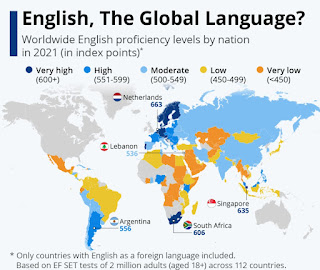 |
| Global English Proficiency scale. |
Africa Defies Global Decline in English Proficiency - Here’s How.
English is more widely understood today than it was 30 years ago, yet for millions, using it fluently in academic and professional settings remains a struggle. The result? Countless missed opportunities, miscommunication, and wasted time - costs that are hard to quantify but impossible to ignore.
The 2024 EF Education First English Proficiency Index, which draws on data from 2.1 million test takers worldwide, reveals some striking trends. For the fourth year in a row, global average English skills have declined - with 60% of countries scoring lower than they did in 2023.
But one region stands out from this worrying trend: Africa.
While not every African country improved, the continent as a whole made notable progress - especially among women. In fact, Africa remains the only continent where women consistently outperform men in English proficiency. Ethiopia leads the way with the world’s largest gender gap in favor of women - an impressive 58-point difference.
Why does this matter? Because national English proficiency strongly correlates with a wide range of development indicators, from income and education to innovation, competitiveness, and global engagement. Though the strength of these links may shift over time, they remain consistently significant - often more so than single metrics like GDP or average years of schooling.
Africa’s growing focus on English skills is paying off. Improved proficiency is unlocking opportunities, boosting employability, and helping countries connect more competitively with the global economy.
So, which African nations are leading the way? According to the 2025 index, here are the top five countries on the continent for English proficiency:
| Rank | Country | Score | Global Ranking |
|---|---|---|---|
| 1 | South Africa | 594 | 11th |
| 2 | Kenya | 581 | 19th |
| 3 | Nigeria | 557 | 30th |
| 4 | Ghana | 534 | 41st |
| 5 | Uganda | 518 | 54th |
Africa’s performance is a clear reminder that investment in language skills can pay huge dividends. In a world where English remains the dominant global language of business, science, and technology, this upward trend offers hope - and a competitive edge - for millions across the continent.
Nshing Rooney
A blogger by heart and a scientist by soul.






No comments:
Post a Comment